Lebanese Mediterranean Diet Recipes
Jan 19, 2018, Updated Jan 04, 2024
This post may contain affiliate links. Please read our disclosure policy.
Here are my 25 Best Mediterranean Diet recipes. The Mediterranean diet is one of the very healthiest ways of eating. Its foundation is plant-based with vegetables, fruits, herbs, nuts, beans, and whole grains along with moderate amounts of chicken, seafood, dairy, eggs. Lebanese cuisine is among the healthiest you can make and eat as part of the Mediterranean Diet!
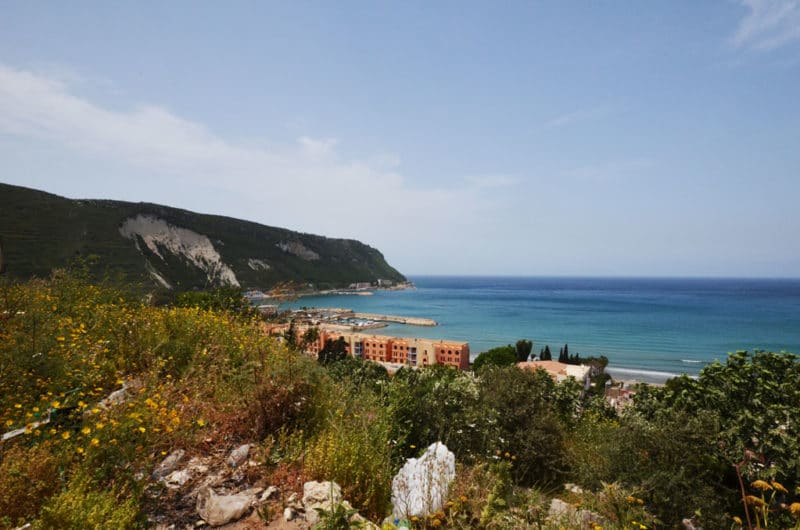
What’s the Mediterranean diet?
The Mediterranean diet is one of the very healthiest ways of eating, as noted repeatedly by U.S. news and World Report – and so many others. They say that “the Mediterranean diet focuses on diet quality rather than a single nutrient or food group. Numerous studies have shown that it reduces the risk of chronic health conditions, including heart disease and Type 2 diabetes while promoting longevity and improving quality of life.”
The foundation of the Mediterranean diet is plant-based food. Meals are created with vegetables, fruits, herbs, nuts, beans and whole grains. Moderate amounts of poultry, seafood, dairy, and eggs are part of the Mediterranean diet.
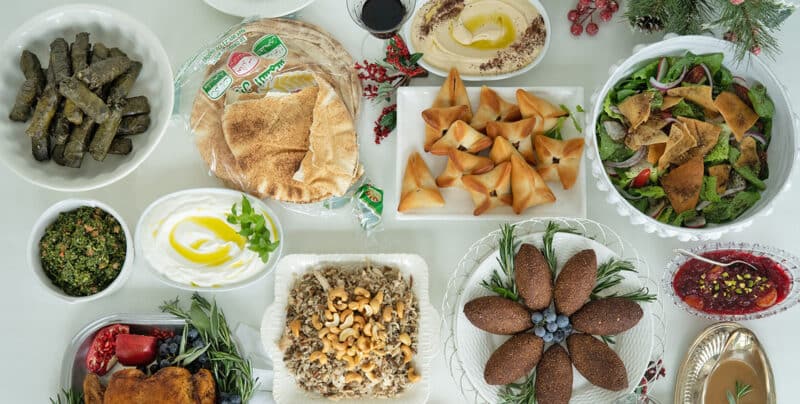
Lebanese is the Mediterranean Diet!
If I had a dollar for every physician who has mentioned to me the importance of eating the Mediterranean way…. Many of them are aware that Lebanese food, my passion!, falls perfectly into the Mediterranean lifestyle category. Yet many of us are not necessarily considering how this remarkable and beloved cuisine of the Middle East that is situated on the Mediterranean Sea delivers all facets of the health benefits of Mediterranean recipes!
Cuisines that are considered Mediterranean include Greek, Italian, Spanish, Turkish, and Lebanese cuisine.
Do you think of Lebanese cuisine when you hear that the healthiest way to eat is the Mediterranean diet? Lebanon is on the Mediterranean Sea, which contributes to the country’s remarkable soil, air, and overall terroir. The Lebanese have long known that our food provides everything we need to eat well and be healthy. But also…it’s more than just the nutrition of Lebanese cuisine that makes it so good for us, which is why it is a very best diet. The way we eat means just as much as what we eat. That is: an eating pattern with relish and pleasure, made and shared with the people we love. Food and family are synonymous for the Lebanese!
More of a lifestyle than a typical restrictive diet, the Mediterranean diet is easier to follow (and sustain) because it simply provides nutritious, delicious foods that avoid the processed and other unhealthy foods that are so hard on us and make weight loss a challenge. Other top categories for the Mediterranean Diet include:
#1 in:
Best Diets Overall
Easiest Diets to Follow
Best Diets for Healthy Eating
Best Diets for Bone and Joint Health
Best Family-Friendly Diets
Best Heart-Healthy Diets
Best Diabetes Diets
#2 in Best Weight-Loss Diets for managing a healthy weight
What to eat on the Mediterranean Diet
Here’s what makes Lebanese eating, and easy Mediterranean diet recipes, so good and good for us:
Olive oil and healthy fats
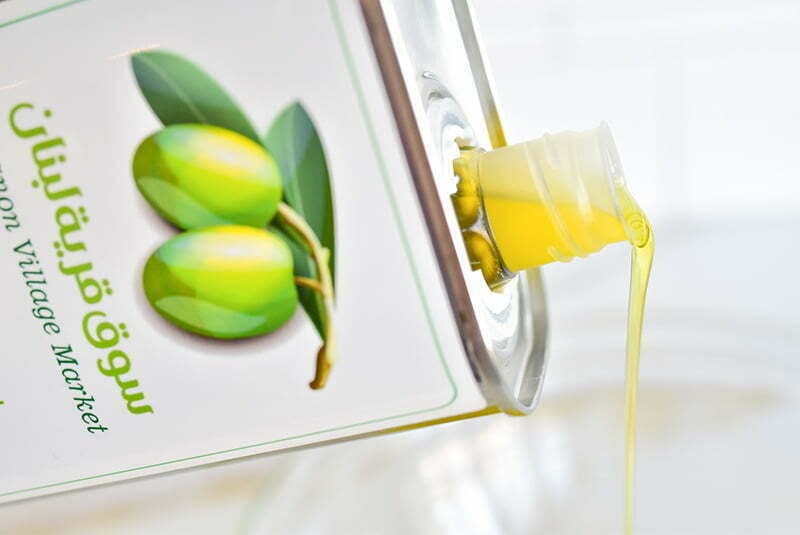
The heart and soul of any Mediterranean diet and very much so in Lebanese cuisine is lots of olive oil, such a satisfying, delicious and healthy fat. We use extra virgin olive oil every day and reserve butter for special-occasion foods. Olive oil begins a sauté, coats cooked vegetables, and tops off many, many Lebanese dishes like labneh, hummus, baba gannouj, kibbeh, and all salads. My favorite pure olive oil comes from Lebanon! Lebanese extra virgin olive oil is world class from fertile land and experienced makers. We also get healthy fats from eating plenty of nuts (pistachios, pine nuts, walnuts, almonds) and seeds (sesame—samsum!).
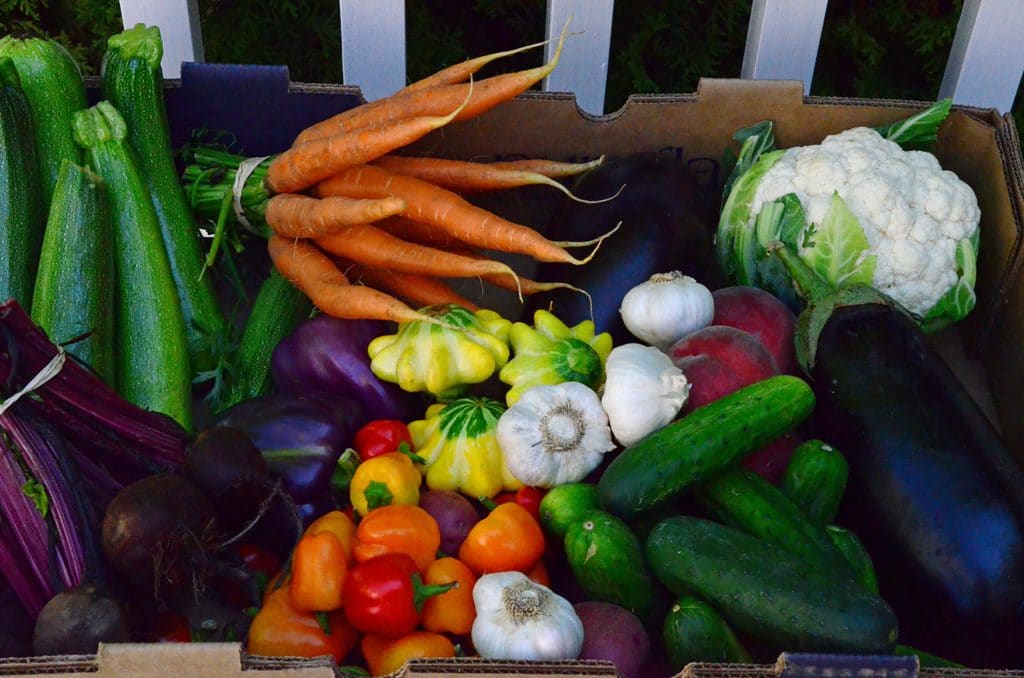
Fresh fruits and fresh vegetables
Plant-based foods, whole foods, are the foundation for our days. The Lebanese are so good with fresh produce… we know how to stuff fresh veggies like none other (and plenty throughout the Mediterranean do it, of course)! We love our classic dish of stuffed grape leaves, cabbage, and kousa (summer squash). And the salads, with leafy greens of all kinds. Fattoush and tabbouleh are the most well-known, and with good reason, but if you haven’t tried easy cabbage salad (incredibly flavorful, crunchy Lebanese slaw), you are in for a treat! One particular favorite of the Blue Zones study (where people live the longest!) is bell peppers, eaten frequently.
As for fruit: no day is complete without beautiful fresh fruit. My father loved to reminisce about how his mother was so nostalgic about the fruit in Lebanon, how enormous and sweet and perfect that fruit was. We don’t know if it was nostalgia or reality that made that fruit so perfect, but that matters not at all. Fruit reigns in the Lebanese diet, well-chosen fruit that is very simply served and enjoyed. Citrus is important among fruits, lemon especially for bringing the tang we love, dressing salads and marinating meats.
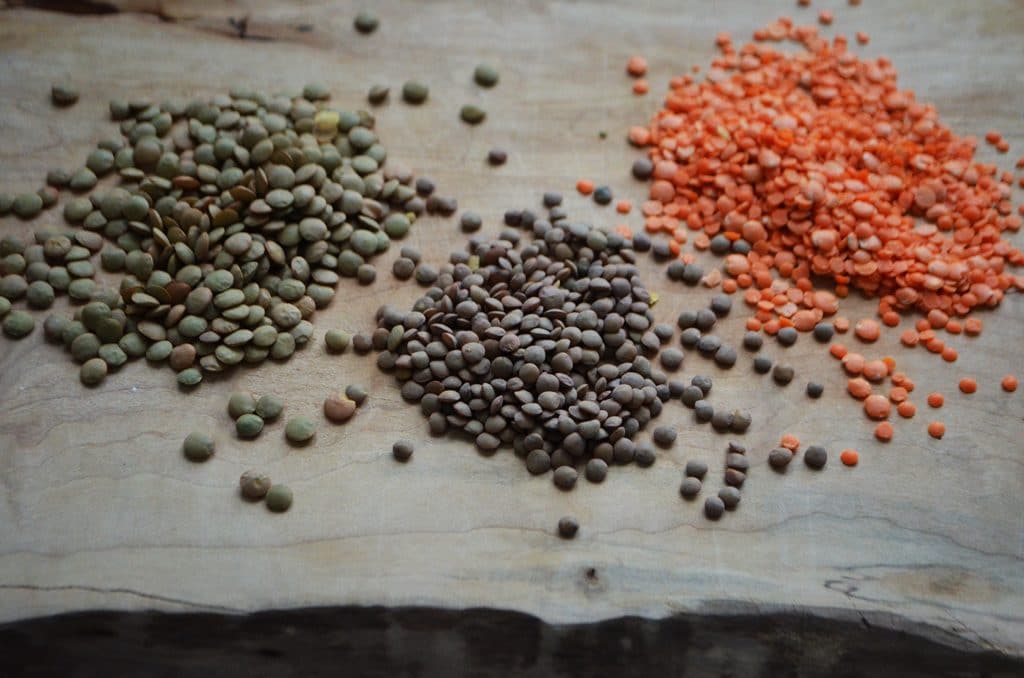
Grains and Legumes
We’re talking fiber, people, and lots of it! From whole grains for bulgur wheat pilafs and mujadara with lentils, to freekeh (there is a great freekeh recipe in my cookbook, cooked like rice, with tomatoes) and a bit of rice in recipes for stuffed vegetables, our way with grains is excellent. All of the hummus we make and eat delivers the garbanzo beans, chickpeas, to our diets in such a delicious way.
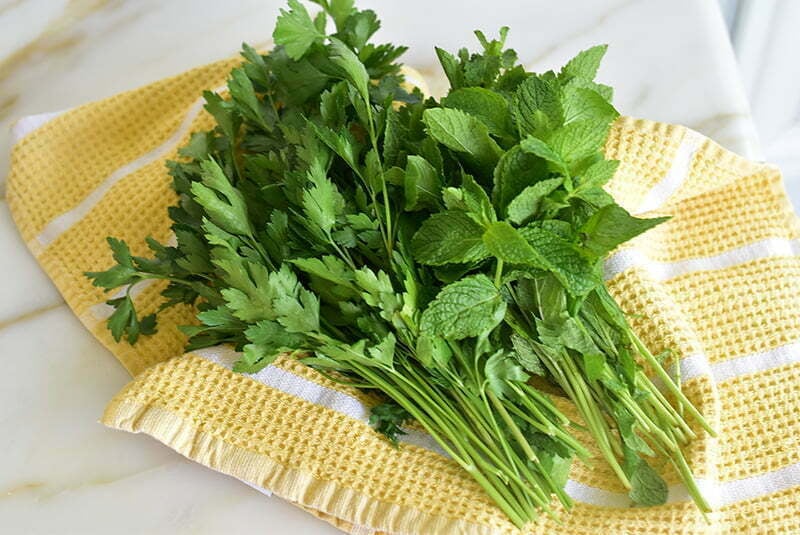
Fresh herbs and spices
When you cook with fresh herbs and spices as much as we do, the result is a delicious flavor explosion, so there is far less need for excessive amounts of salt and fat in a dish to get it to taste great. Mint, parsley, cilantro—you name it, and we’re going to use it for great flavors in our cooking. Tabbouleh salad, as my culinary school teacher liked to say, is not a grain salad, but an herb salad. And what goes for herbs goes too for spices—our world of flavor is unlocked with a dusting of za’atar, sumac, dried mint (Mint Salt!), cinnamon, and many more spices. Other flavor makers in this category include basic additions like lemon zest, fresh lemon juice, and black pepper to wake up our taste buds.
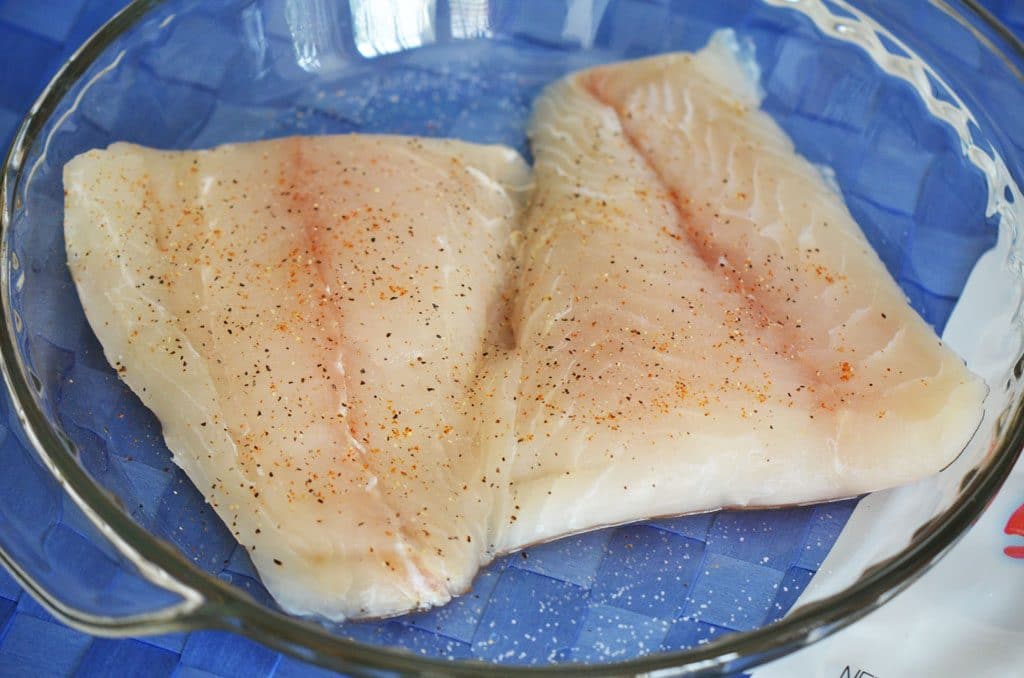
Lean proteins
We do love our grilled red meat with shish kebab and lamb chops, but these are eaten proportionally less than all of the above. And generally, the meat we eat is lean lean lean, as in kibbeh, the “national dish of Lebanon.” The Lebanese love their fish, too, and I wish I cooked fresh fish more often. Spicy snapper with tahini sauce? Pistachio-crusted white fish (cookbook recipe, page 133!)? Love you.
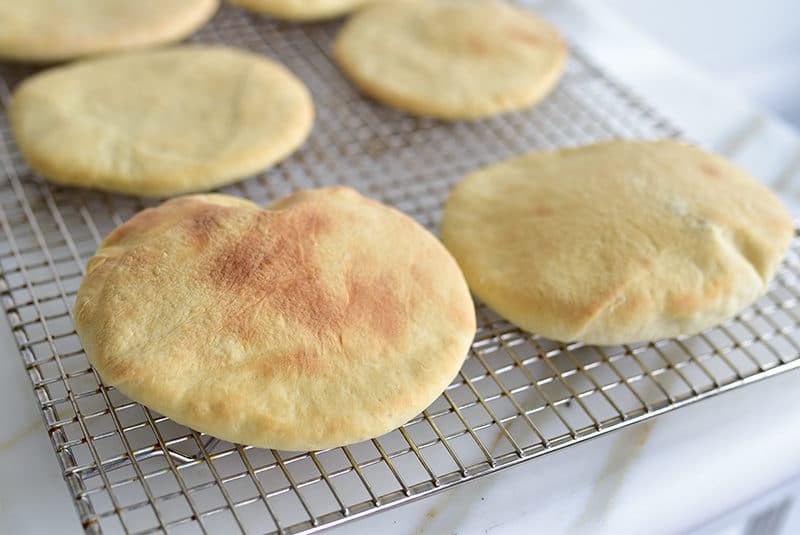
Fresh bread
Okay, I know. But fresh, homemade or excellent bakery-made breads can be and are a healthy part of how we enjoy eating. Where would we be without pita bread and flatbreads?! The United Nations Educational, Scientific and Cultural Organization (UNESCO) has included the Lebanese flatbread, Manoushe, on its list of intangible heritage traditions. So there’s that! It’s all about proportions, frequency, and the whole diet overall that allows for Lebanese breads and our fatayar to play the beloved role they do without taking us down.
Tell me more about what you love about eating Lebanese! And thank you Lebanon, for giving us such a wonderful way to eat and live.
25+ Best Mediterranean Diet Recipes
From mezze, salads and sides to Mediterranean diet dinner recipes, you’ll find all kinds of ideas here to try, using simple ingredients. Put together a full meal or select an easy recipe or two to enjoy for snacking, lunch, breakfast.
Mezze, Dips and Condiments
- My Best Homemade Hummus Recipe is one to know, make, and love! Smooth and luscious.
- Lebanese Baba Gannouj, the smokey eggplant dip that comes together so easily.
- The ultimate garlicky goodness that is Toum, Lebanese Garlic Sauce, changes the game with its versatility and flavor.
- Lebanese Turnip Pickles are the pink pickles often rolled up into wraps and always alongside a Lebanese lunch, dinner, or mezze.
- Kalamata Olives. Must have. Often.
- Labneh. This is thickened yogurt, Lebanese style, with great depth of flavor and tang.
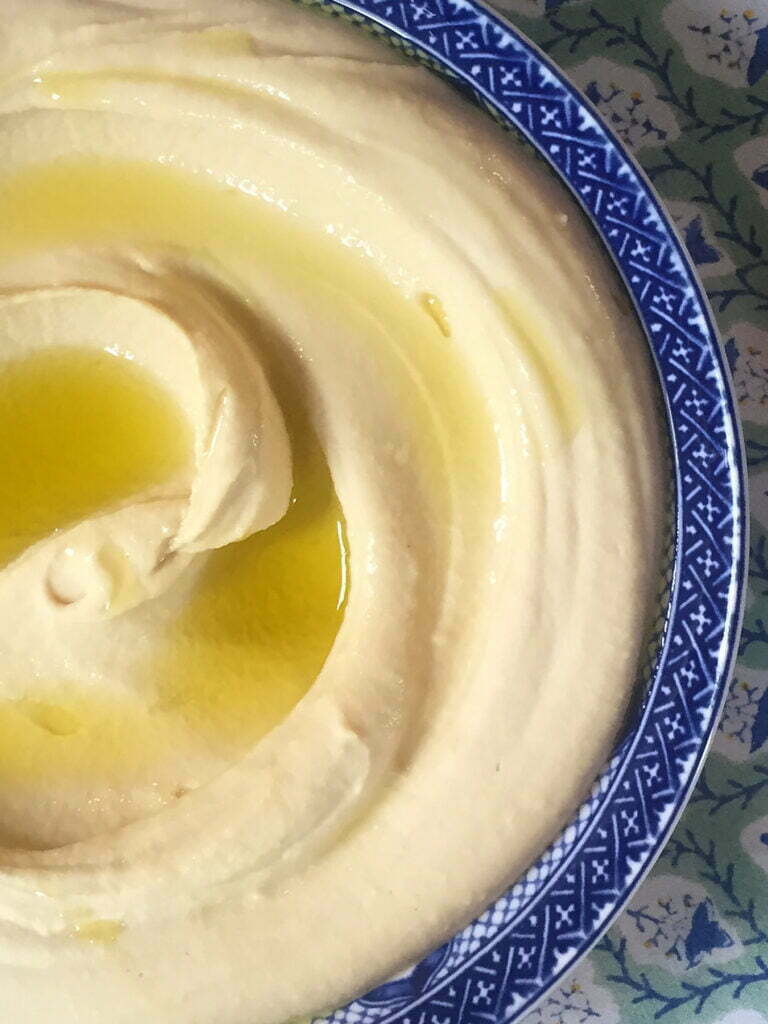
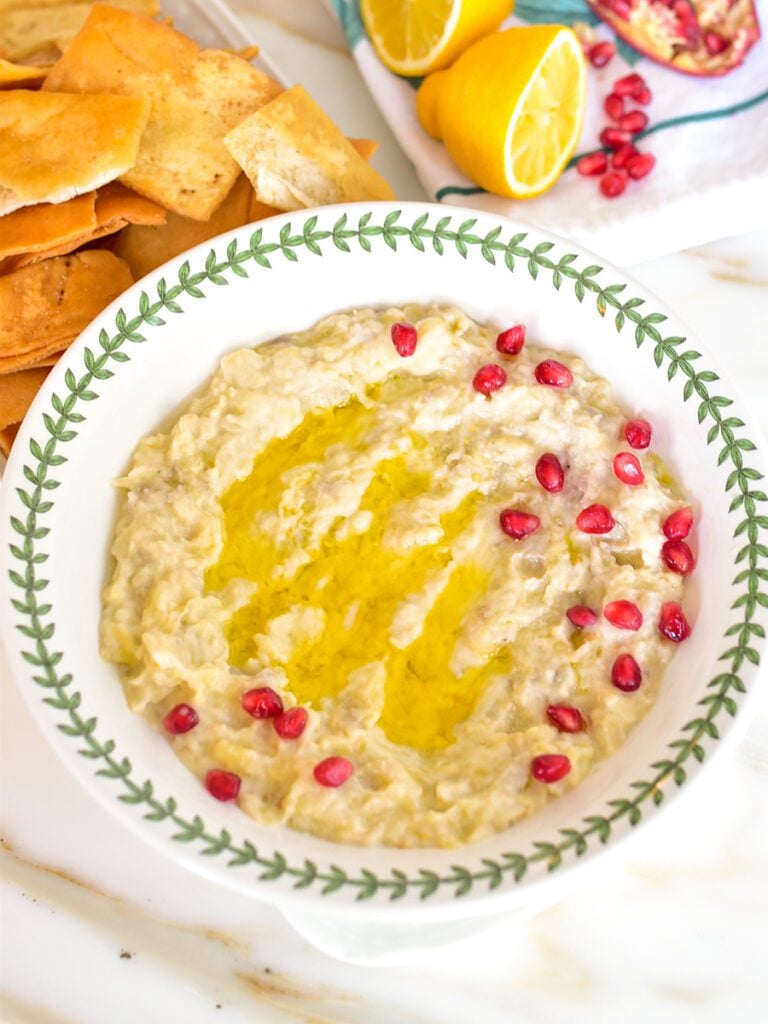
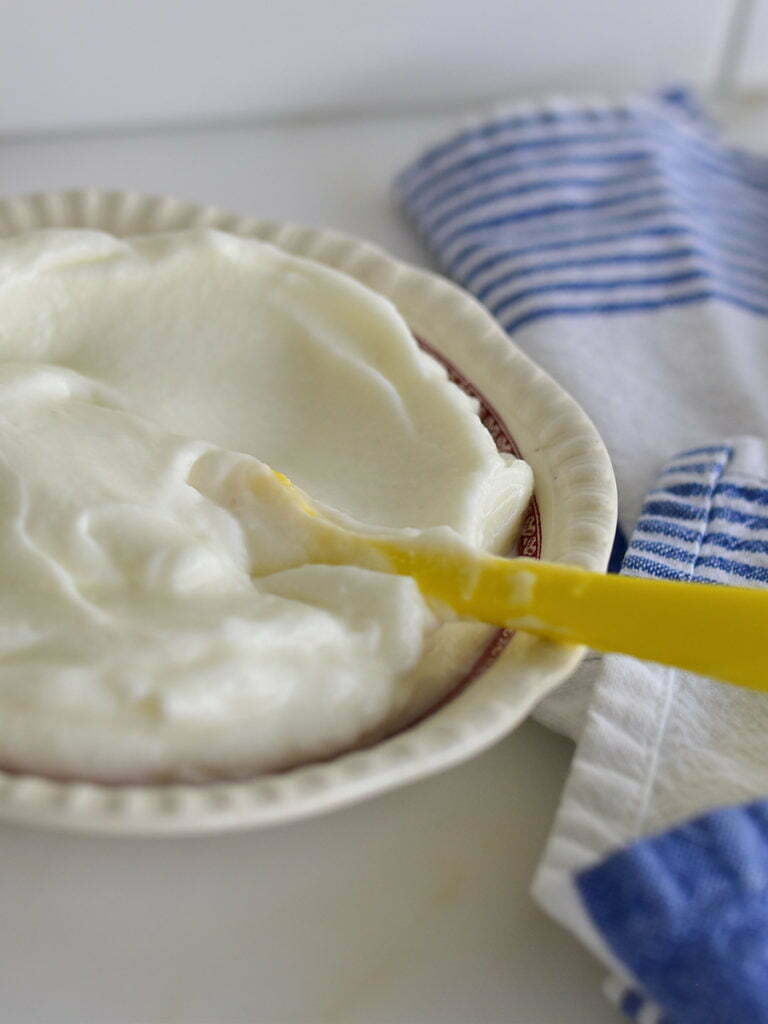
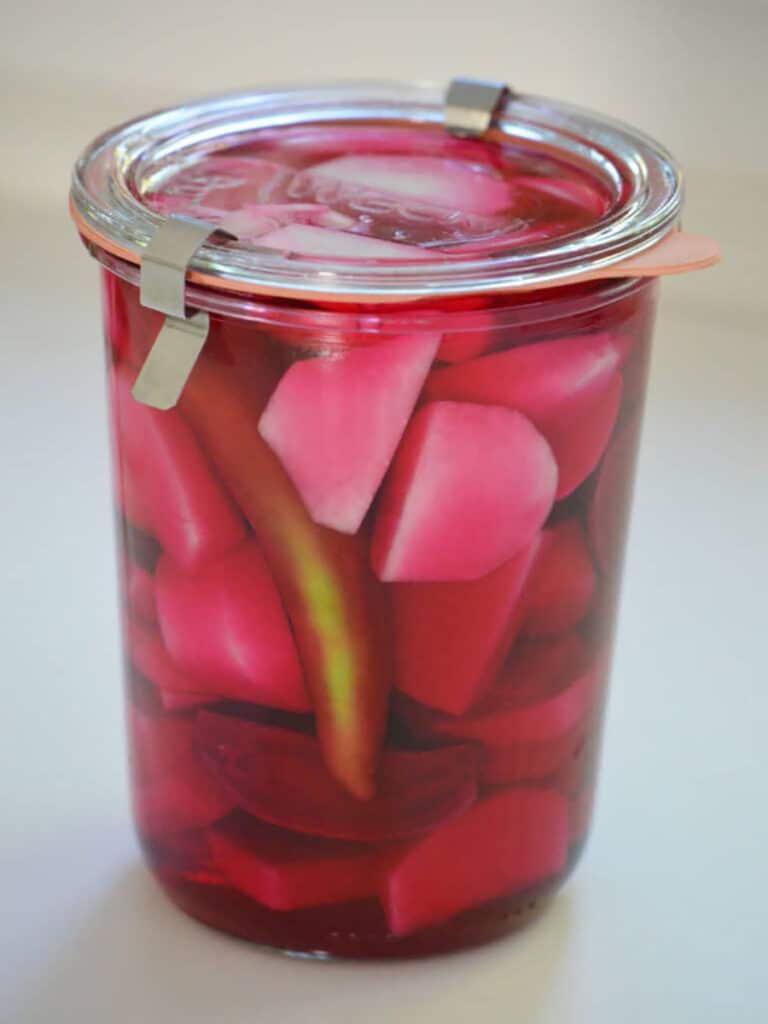
Mediterranean Salads and Sides
- Lebanese Salad (Salata), a classic salad with lemony vinaigrette and mint.
- Try Lebanese Fattoush Salad with crushed pita chips in the mix.
- Tabouli Salad is the well-known Lebanese salad including parsley, mint, tomatoes, and fine bulgur. Go gluten-free with Quinoa Tabbouleh Salad.
- A cool, freshing Crunchy Yogurt Cucumber Salad goes with many, many main dishes.
- Easy Cabbage Salad with Garlic and Lemon uses tons of lemon and a few simple ingredients for a very delicious salad.
- Change up your caprese salad with my Caprese Salad with Pomegranate and Mint
- Use pomegranate molasses for Pomegranate Glazed Sweet Potatoes
- Olive Oil Mashed Potatoes get a flavor and good health upgrade without butter
- Roasted Brussels Sprouts with Pomegranate are incredibly flavorful and finished with toasted nuts
- So many Mediterreanean cultures stuff grape leaves. Try my Lebanese Stuffed Grape Leaves for a lemony, delicious batch.
- Another great way with pomegranate molasses: Green Beans with onions and pomegranate
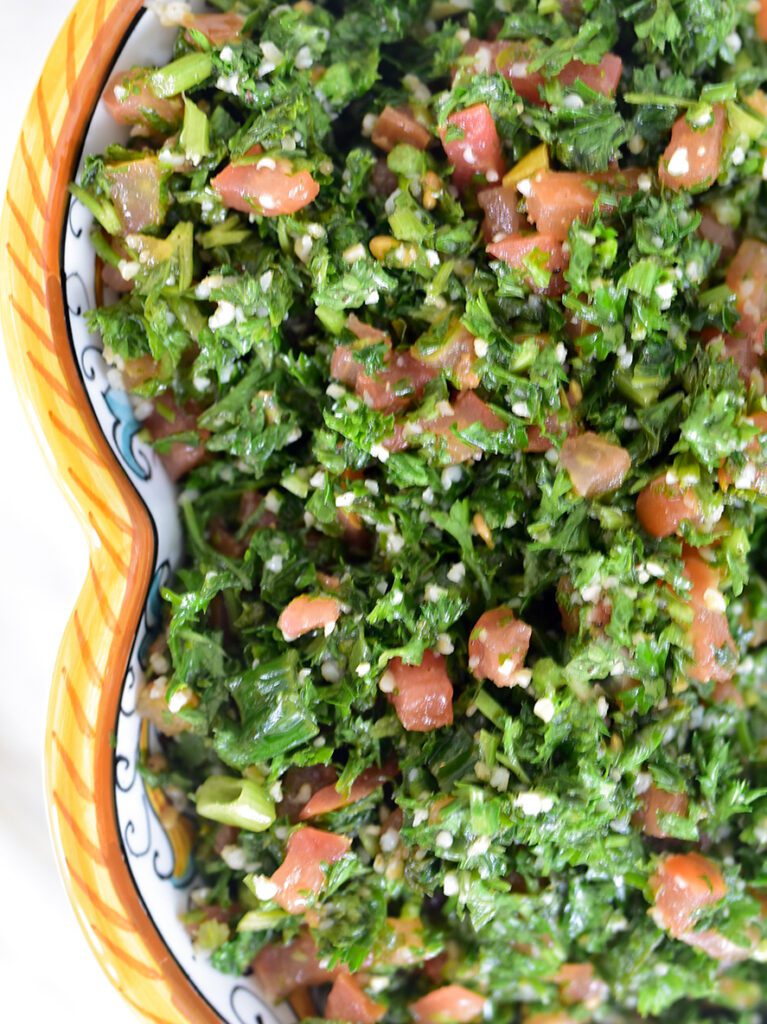
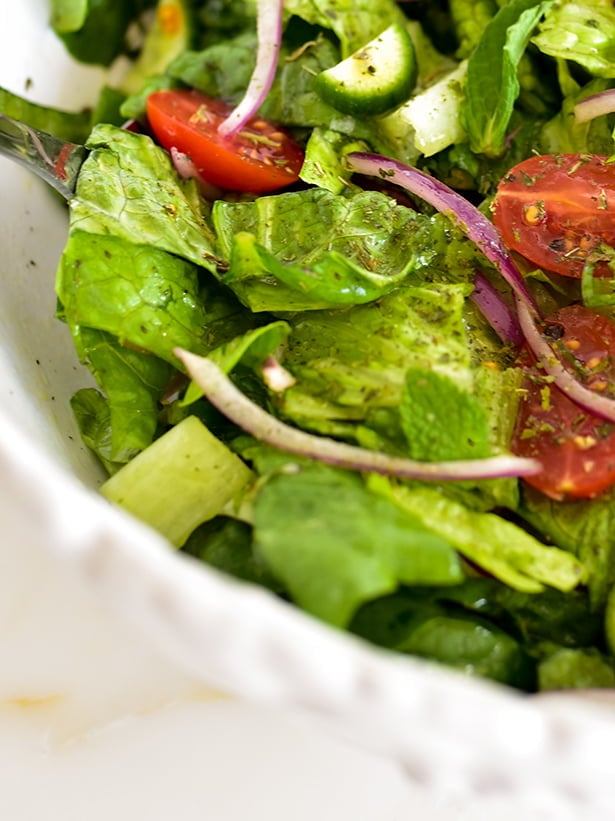
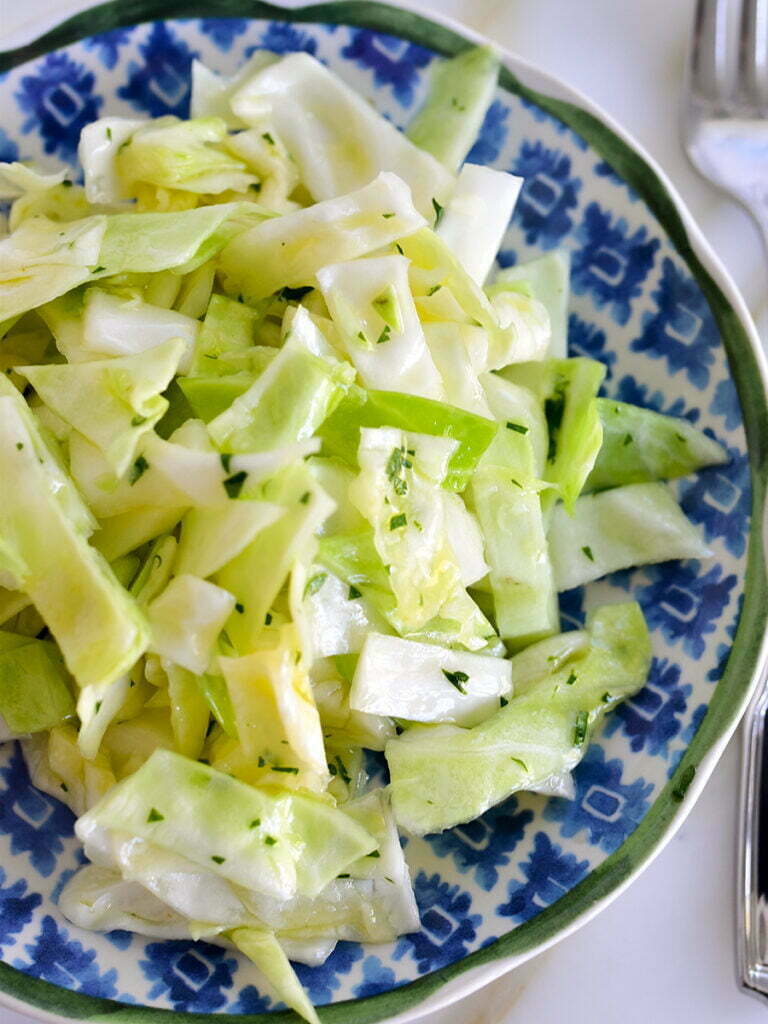
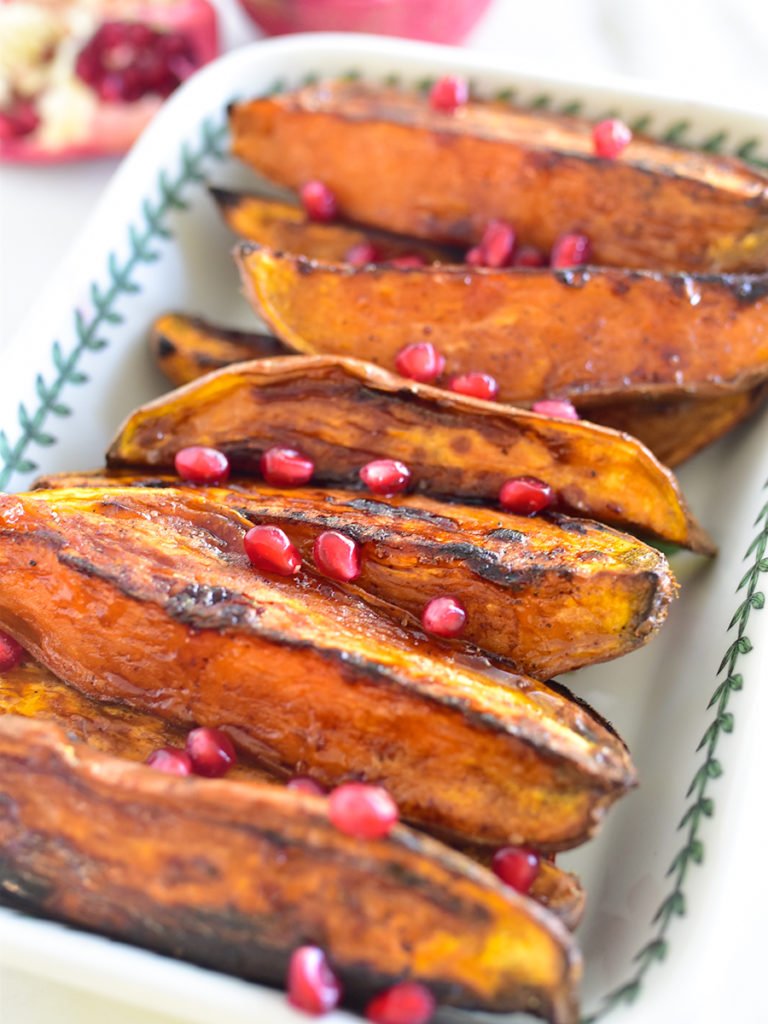
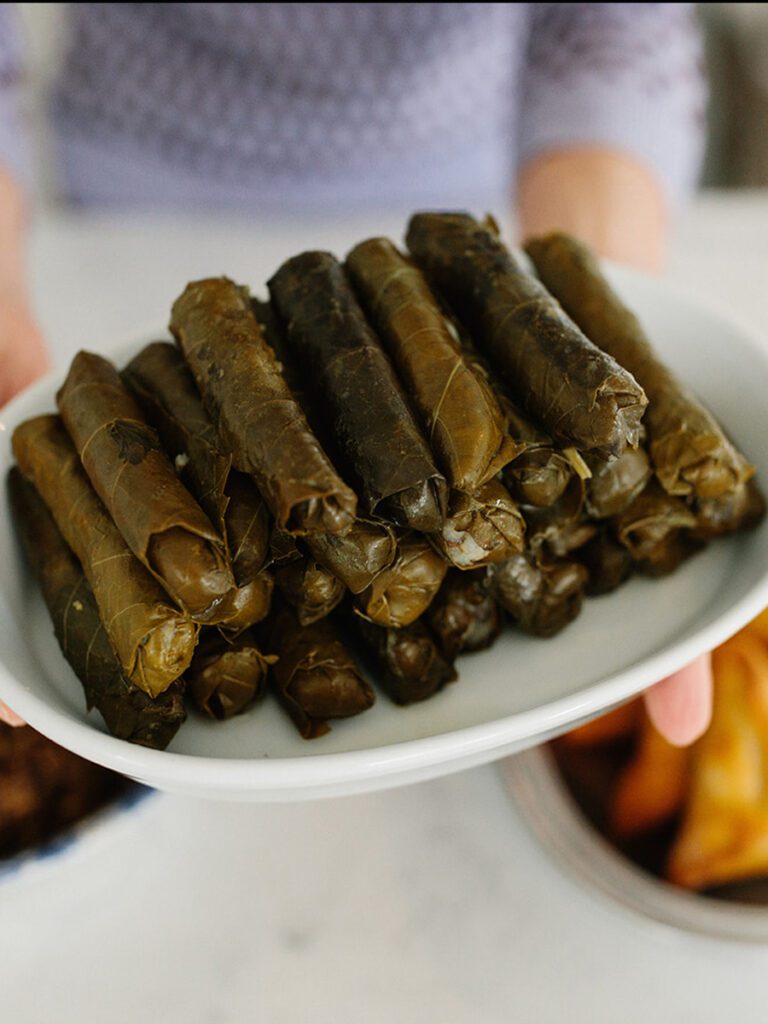
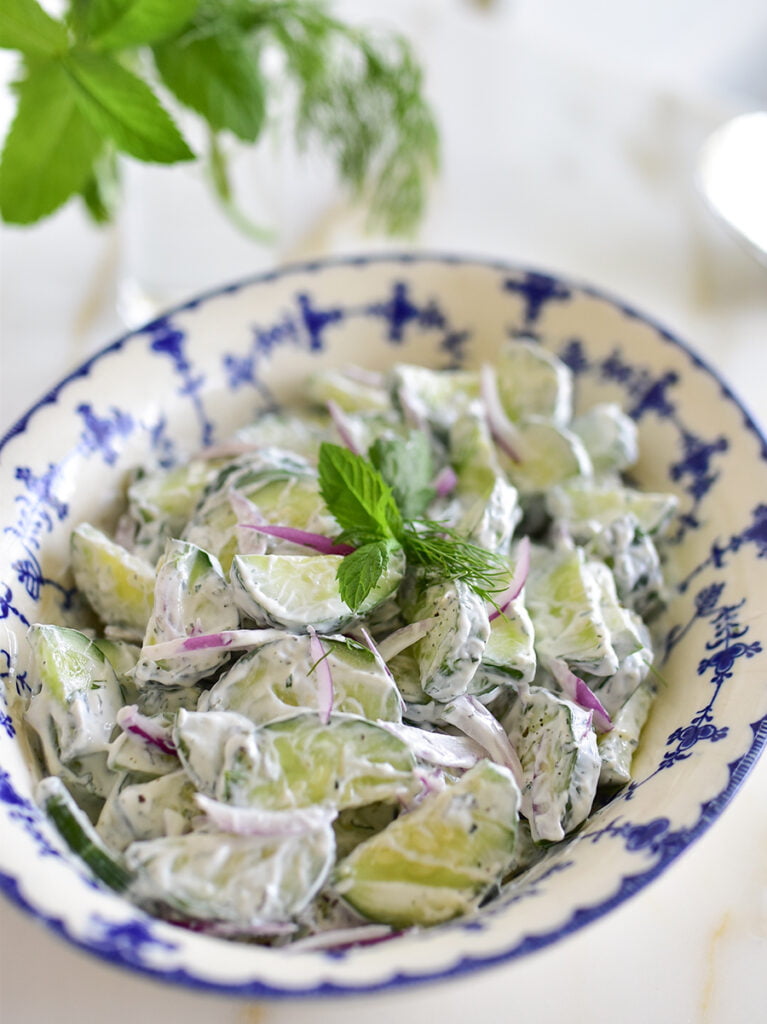
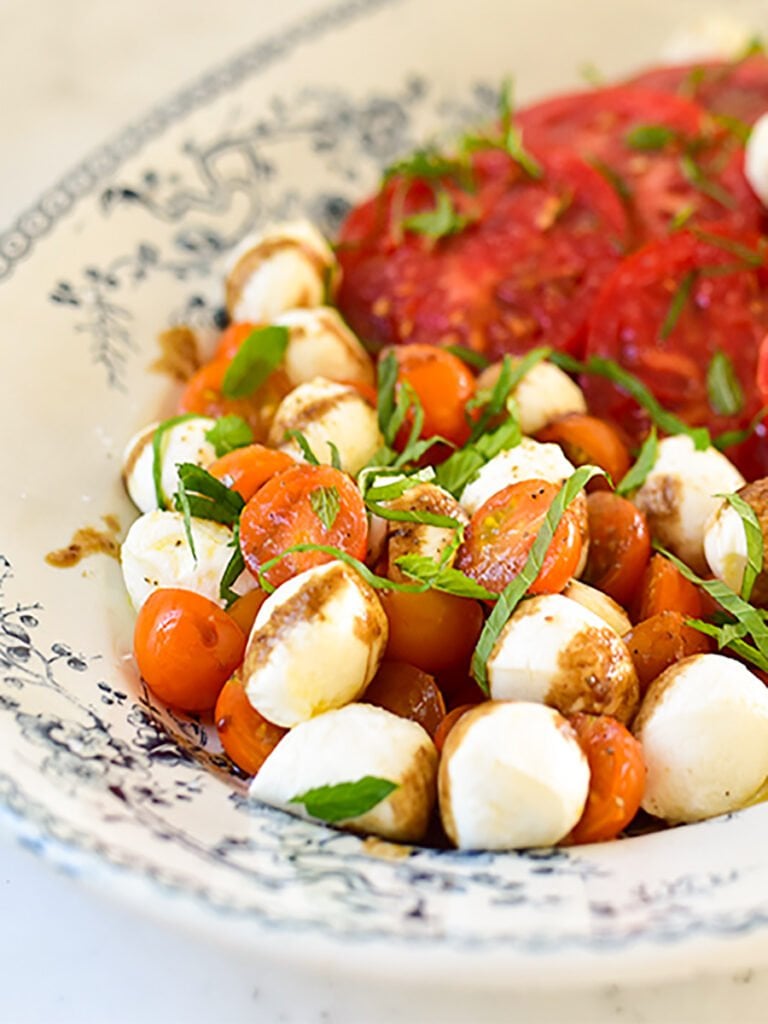
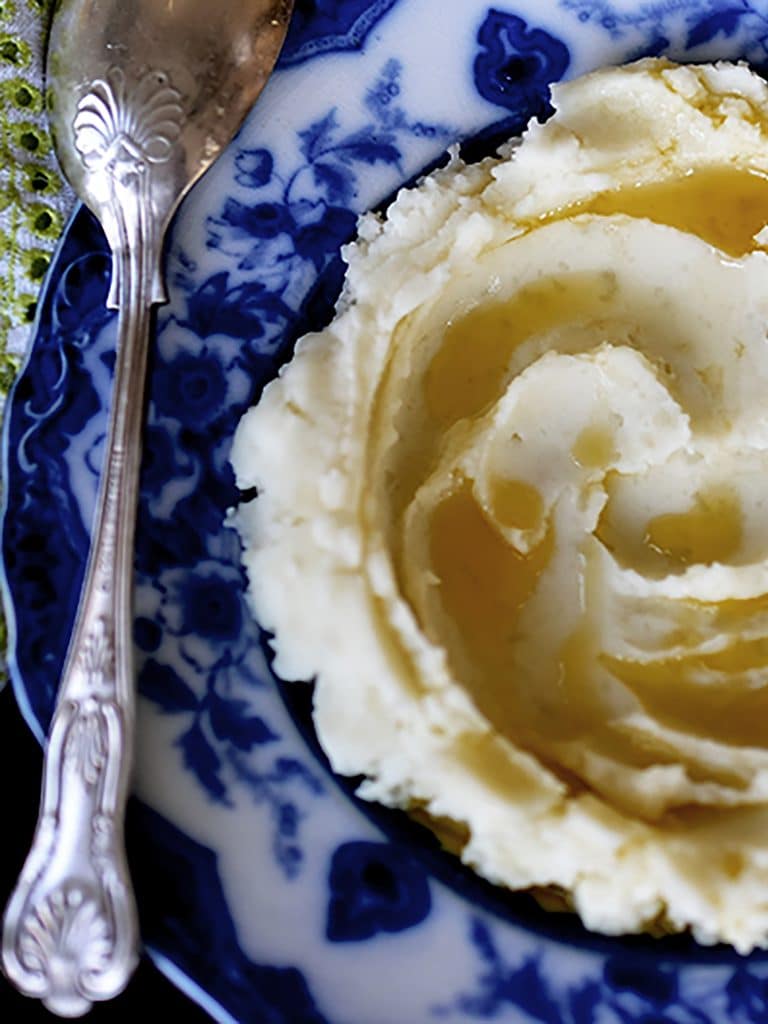
Mediterranean Main Dishes
- The ultimate in high protein and fiber in a plant-based dish: Lebanese Mujadara, lentil bulgur pilaf with caramelized onions.
- Spicy Fish with Tahini and Pine Nuts is sautéed with a delicious twist.
- A favorite of the stuffed vegetable dishes is Lebanese Stuffed Kousa Squash, using summer squash (zucchini or kousa).
- Chicken is such a natural with 7 Spice! Give Arabic flavor a delicious whirl with my Simple 7 Spice Chicken
- Enjoy the marinated goodness of Shish Tawook (Grilled Chicken Skewers)
- Chicken Shawarma is huge on flavor, made with skinless boneless chicken thighs
- Garlicky Sumac Shrimp Skewers is like a Lebanese-style scampi, garlicky and delicious
- Make a hearty soup with Lebanese Vegetable Soup with Chickpeas and Kale
- Lebanese Beef Kafta is one of the top recipes on this site for a reason! So delicious!
- Traditional Lebanese Baked Kibbeh is a lean dish combining lean ground beef or lamb with onion, spices, and fine bulgur.
- Get your eggs on any meal of the day with Shakshuka, eggs poached in tomatoes with avocado, labneh, and herbs.
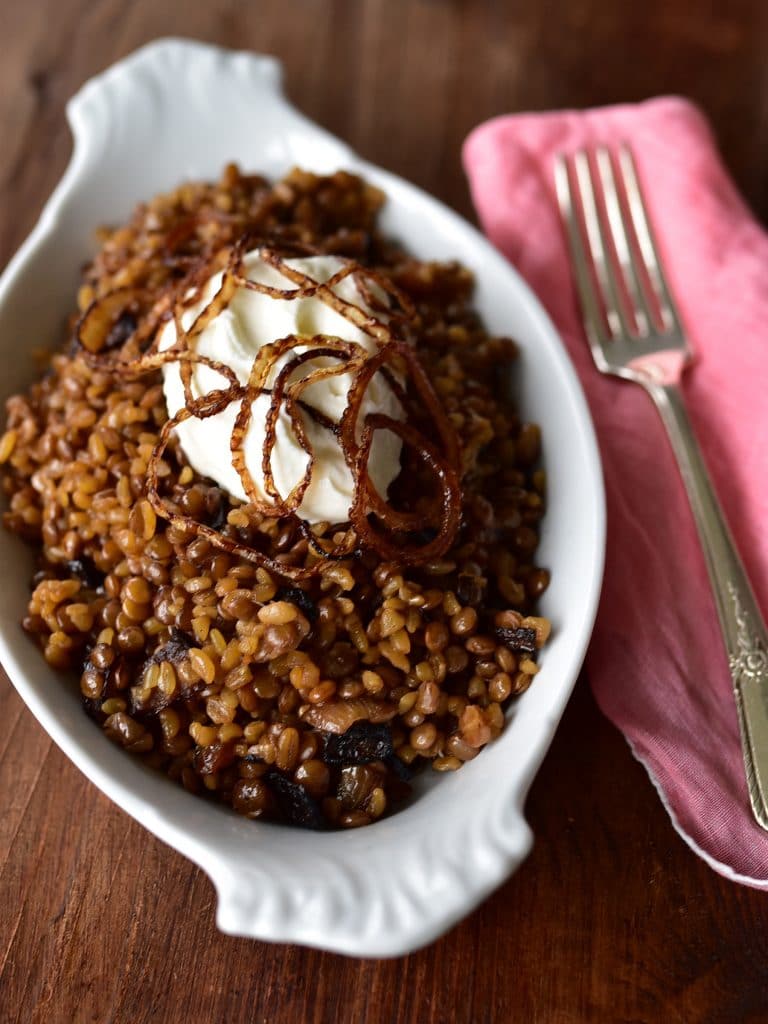
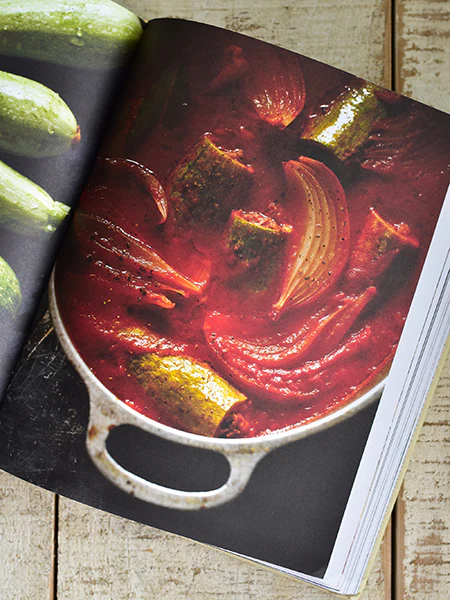
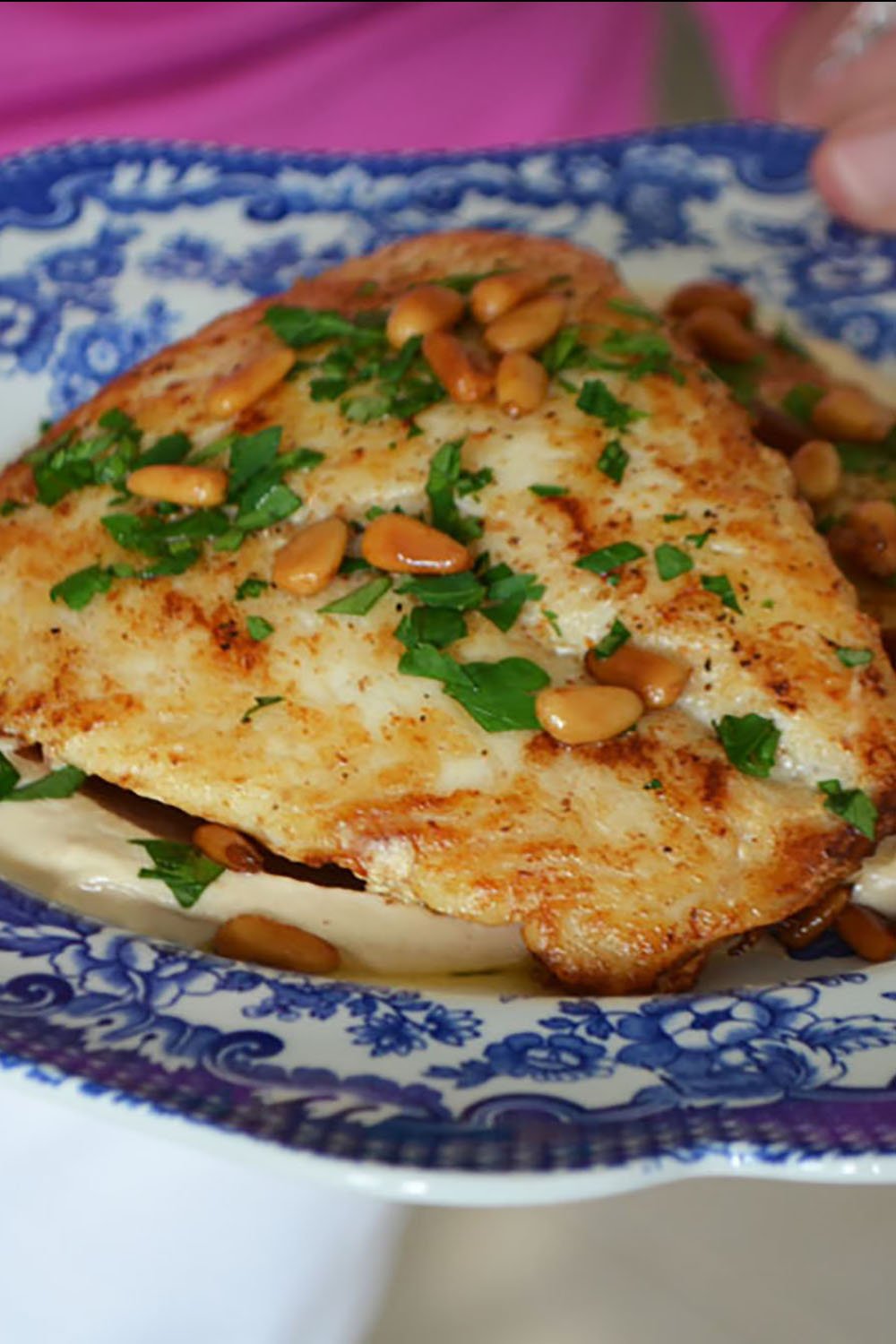
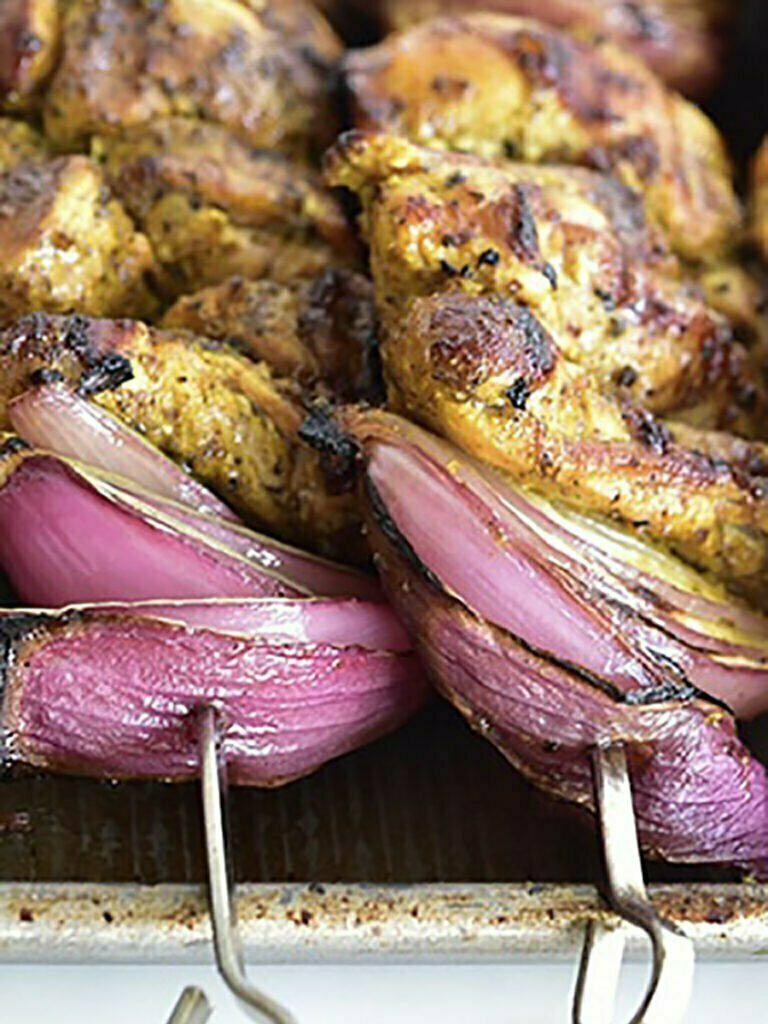
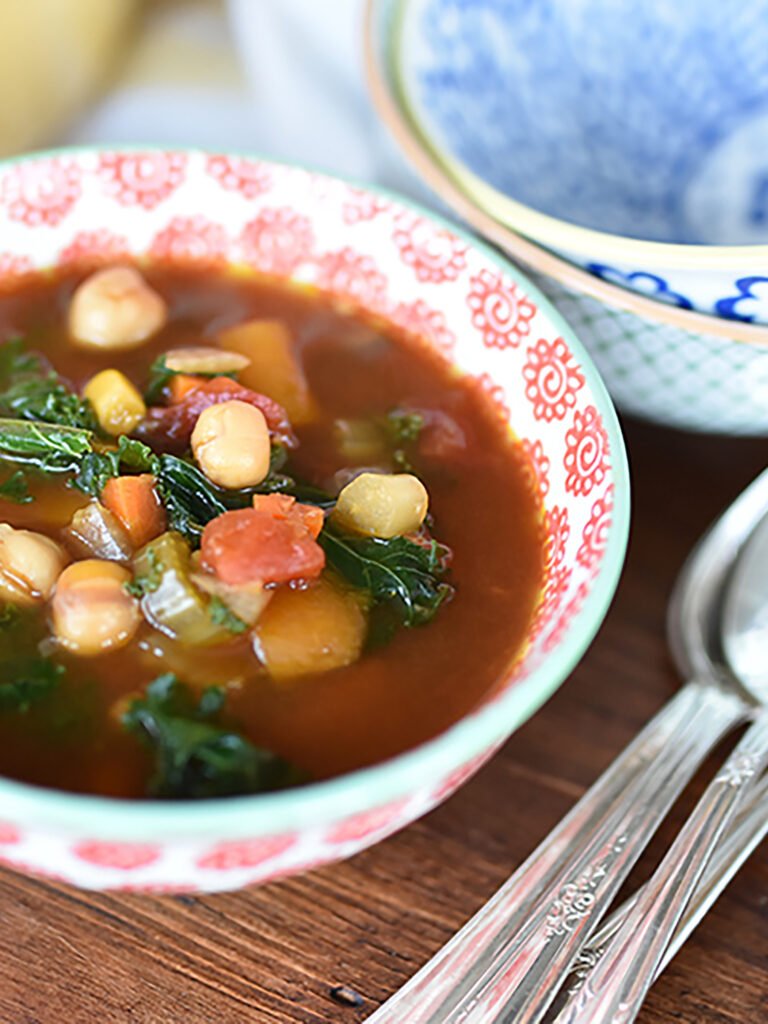
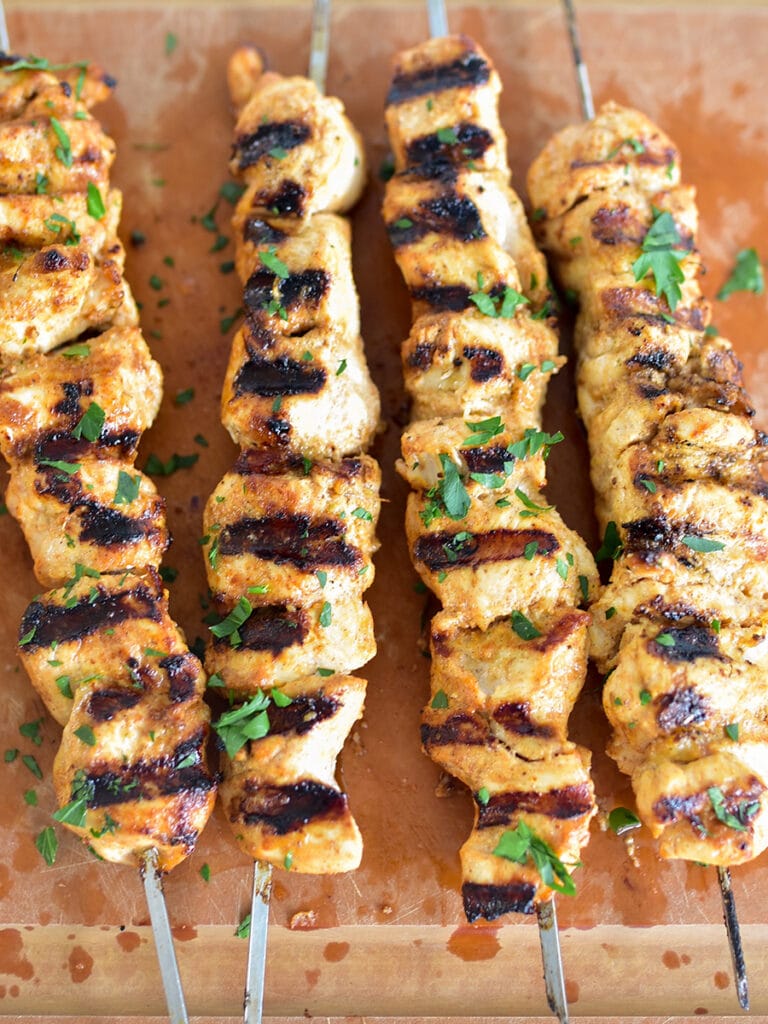
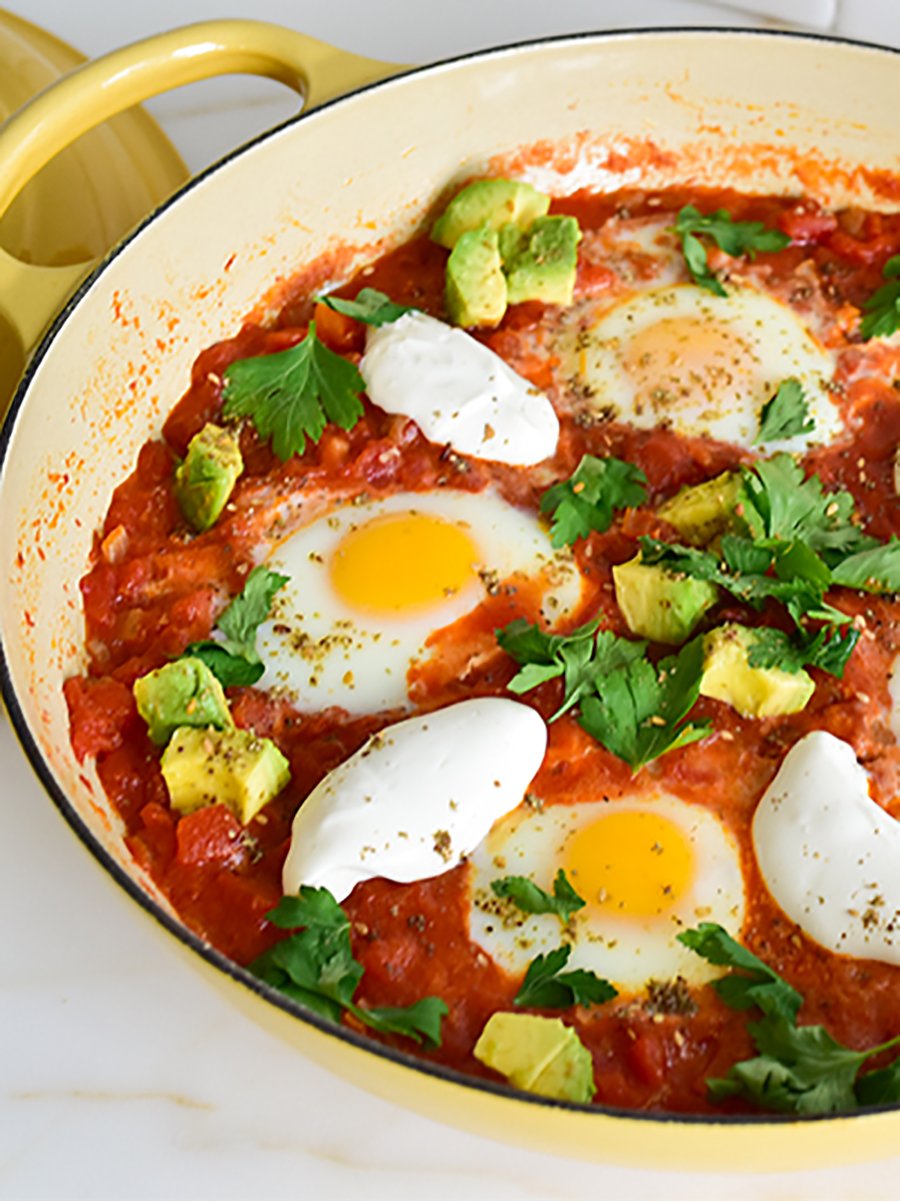
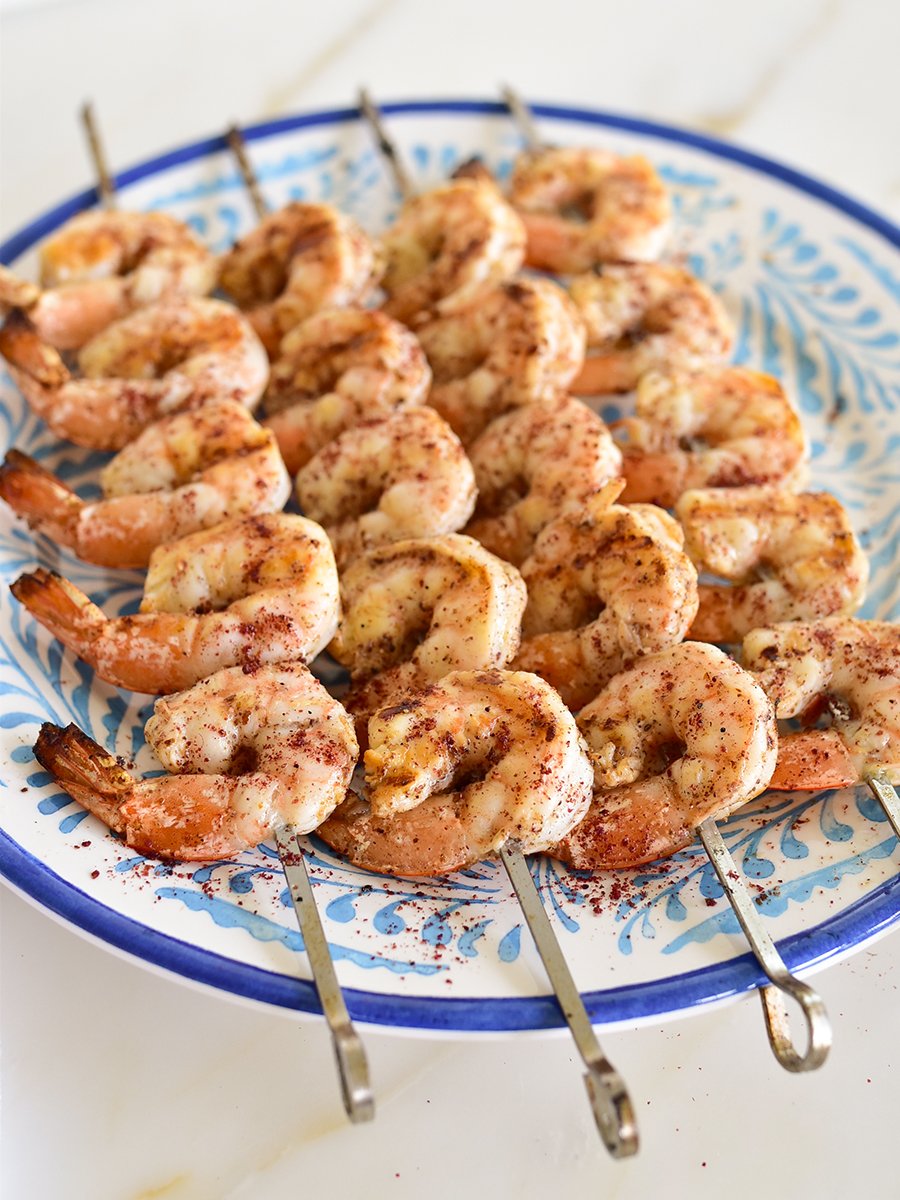
FAQs and Tips
Go for lots of fresh vegetables, lean meat and chicken (no skin!), and high fiber, high protein grains and legumes such as bulgur and lentils, chickpeas and other beans too. Eat salads frequently and make it easy by purchasing washed greens and other chopped additions.
The main goal is to avoid sugars and unhealthy cured meat fats at breakfast time, opting instead for protein-rich, high fiber foods. Consider baked eggs with labneh and spinach, bulgur grain bowls, Shakshuka, yogurt with nuts and dried fruit, or fresh fruit salad.
Dinner options on the Mediterraenan diet are so vast, so many! The rule of thumb is to eat lean proteins such as fish and plant-based proteins such as beans and lentils, and avoid fatty meats. Big salads such with lemony vinaigrettes rather than heavy creamy dressings are standard practice, taking up more of the plate than anything else on it. Carbohydrates are limited but you’ll get satisfaction and feel full with other types of side dishes such as broccoli, cauliflower, and roasted brussels sprouts. Condiments impart lots of flavor on the Mediterranean diet, such as chopped fresh herbs and spices, extra virgin olive oil, and pickles rather than sugar-loaded ketchup or fatty mayonnaise.
Extra Virgin Olive Oil
Fresh Vegetables such as bell peppers, green leafy salads, cabbage, broccoli, cauliflower
Fresh fruit such as blueberries and raspberries
Fish and Seafood
High protein and fiber legumes, such as chickpeas, cannellini beans, lentils
Healthy Grains such as bulgur and quinoa
Nuts, a handful regularly: walnuts, pistachios, and almonds
Tips to consider when making Mediterranean-style meals:
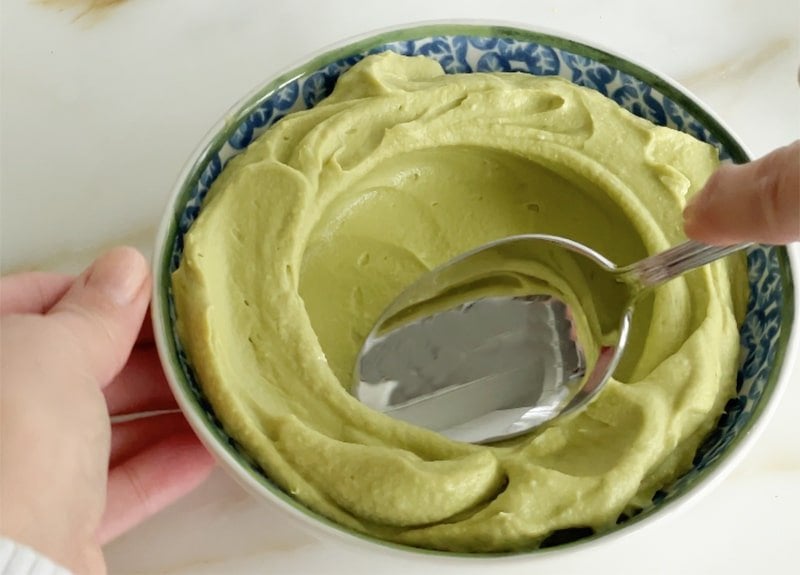
Build a bowl!
Bowls are a great way to incorporate many elements of the Mediterranean diet priorities: start with a base of a cooked whole grain such as bulgur or quinoa, or a lush dip such as hummus or baba gannoush. Tuck some fresh greens or a salad underneath or over either of those. Then layer from there with what you have on hand: roast vegetables or sauté them with onion, garlic, and spices. Same with chopped pieces of lean chicken, tofu, salmon or shrimp, cooked stovetop, on the grill, or in the oven. A cool dollop of labneh finishes the bowl, along with a drizzle of olive oil and a handful of toasted nuts or sesame seeds. Delicious!! Satisfying!!
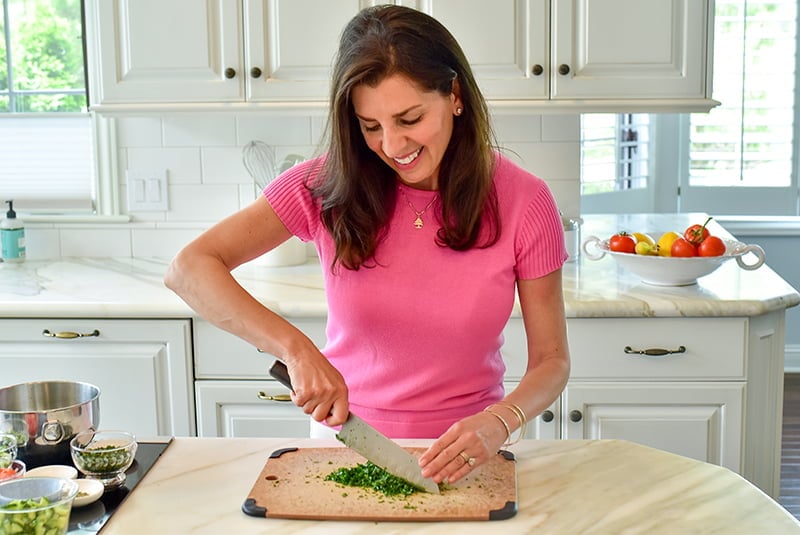
Make ahead
Make ahead the pieces and parts of your Mediterranean meals. Prep early in the week so you have cooked vegetables available, fresh fruit that is clean and sliced, cleaned and picked herbs, grilled or roasted chicken and salmon. I like to slice onions, chop cucumbers, and shred lettuce and cabbage and keep these in separate airtight containers, Then building a meal is fast, easy, and fun.
Toast nuts when you bring them home from the grocery store, then store them back in their bags, airtight, in the freezer. Toasted nuts have deep, rich flavor that is delicious to enjoy out of hand or atop salads, bowls, fruit, and in many recipes.
Mix it up!
Grab a fresh vegetable you may not have cooked before and give it a whirl. Generally a good steam, boil, or roast will do it with a drizzle of olive oil for a simple side.
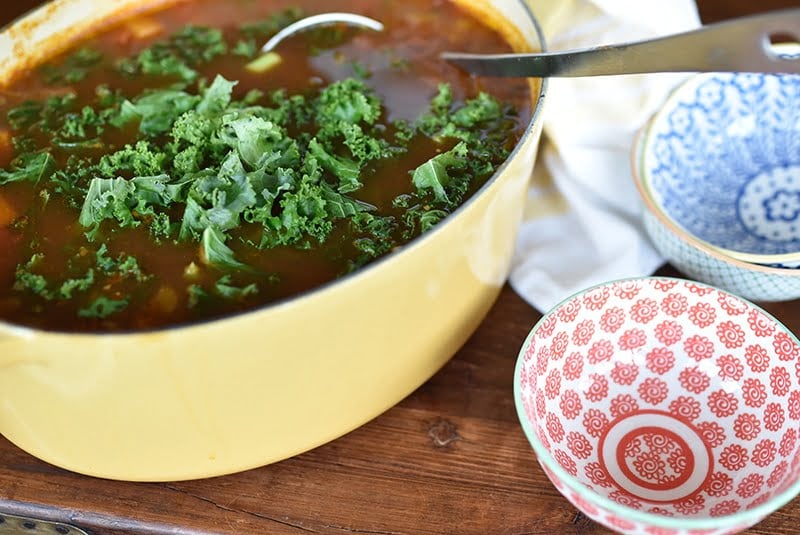
Make soups
Soup is such a simple way to deliver great health and flavor, and cook economically with what you may have on hand. Start in a large pot with a base of chopped onion, celery, and carrot sauteed in olive oil, and cooked until soft but not browned. Then add in whatever you may have to build a delicious combination: mushrooms and wild rice, chicken sausage and minced garlic with diced canned tomatoes, pasta such as tortellini or small noodles.
Once this all cooks with a little salt and spice, add broth–chicken broth, vegetable broth, beef broth, or water that can be seasoned with spice, salt, and other aromatics such as fresh herbs and garlic. Bring the soup to a boil to cook the ingredients, then reduce to a simmer and allow the flavors to meld for a few minutes before serving. Soups are also terrific make-ahead meals that require a quick warm-up. It’s delicious–and a-okay–to serve some crusty bread or homemade rolls with the soup. With the Mediterranean diet, bread is not off-limits; it is just eaten in moderation and as a little side treat rather than the center of the meal.
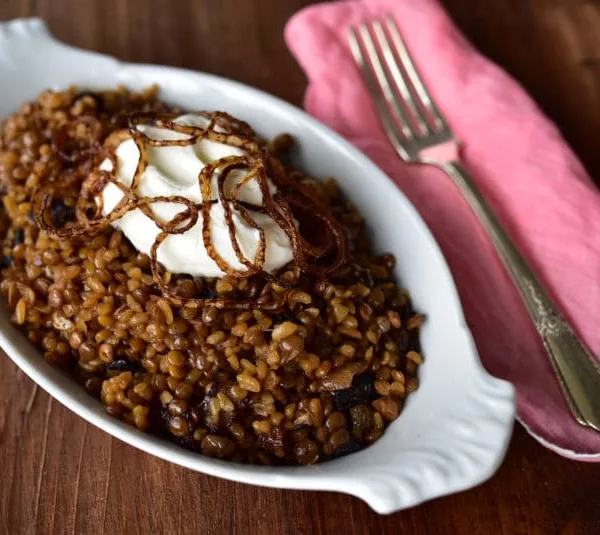
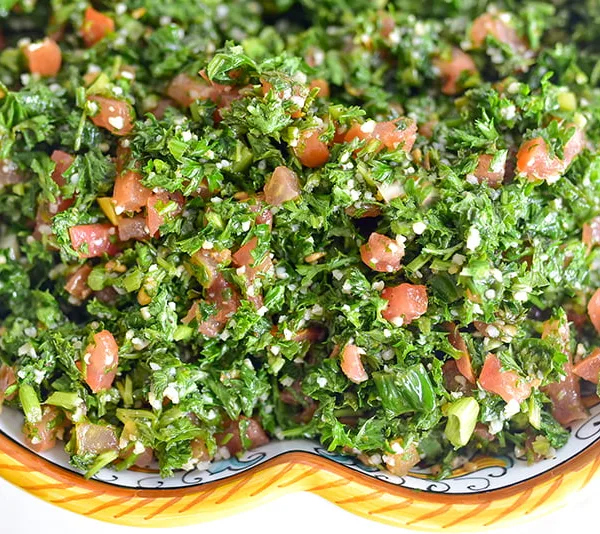
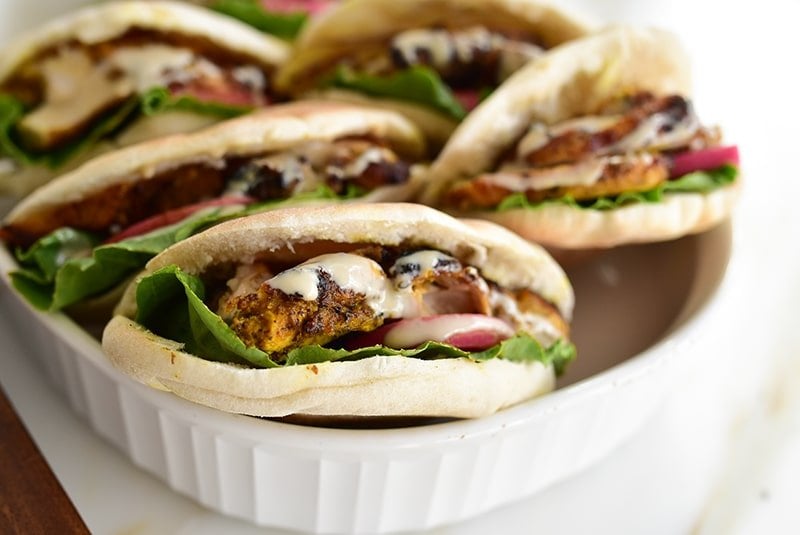
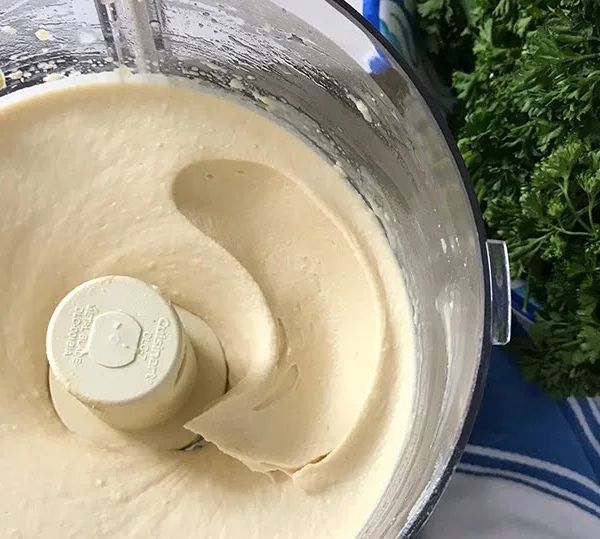






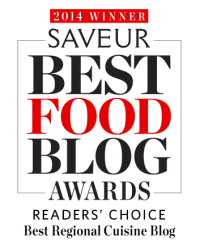
I have never heard of stuffed grape leaves before, but that sounds like something interesting to try. My parents are thinking about making a trip to Abu Dhabi, and want to try as many different foods as they can while there. I wonder if they will have the opportunity to try this.
I’m sure they will Shaylee! Sounds like a wonderful trip.
Hello Ms. Abood,
Thank you for this page! I’m a student at Western Michigan University and I’ve chosen your book for a project in my History of Michigan class. Part of my project will be digging into how, when, and why people from specific Middle Eastern countries have come to Michigan, and to try out some of your recipes. I’m about to order your book, but I’ll be making your potato salad this weekend! Yum!
I love cooking, specifically Mediterranean food, and, with my family being Croatian, we share many similarities. I can’t wait to see what you do with stuffed cabbage! Kalamazoo is very lucky to have a Lebanese restaurant and grocery store, Bab El Salam. The owner is a delight, and the selection is wonderful, so I anticipate finding everything I’ll need. Thank you for giving me such a fun book to do my project on! I can’t wait to read your family stories and to make your recipes.
Best,
Angel Johnston
Kalamazoo, MI
Beautiful, Angel! I’m honored! Thank you and enjoy your project–I’m here to help if you need anything along the way.
How much is your cookbook?
Hi Laurie–you can get a signed book for $30 here! Also find the book wherever books are sold. Thank you!
Maureen,
I so enjoy reading your recipes, stories about family and favorite foods, products that you have selected, photos that capture the essence of great food and more…You shine and convey a spirit of Lebanese
American friendship that sells your cookbook. Keep on writing and sharing…
Elaine
Kol wa Shkor. Eat and be Thankful!!
Amen to that!
Your posts are priceless
They bring back memories of home,family and love
Keep ‘me coming, cousin!
That means so much, thank you!
Thank you Maureen for such a lovely window into Lebanese cuisine and culture.
Indeed Lebanon is a beautiful country in and created in our own home.
Thank you Georgia, very much.